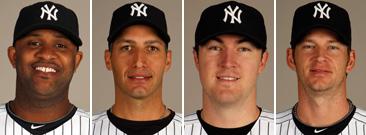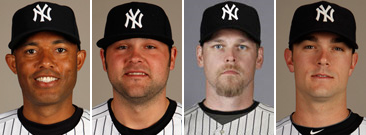October 4, 2010
Getting to know the enemy: Bring on the Yankees (again)
For the second straight season and fourth time in their last five playoff appearances the Twins will face the Yankees in the ALDS. New York finished a game behind Tampa Bay in the AL East, so instead of hosting Texas as the division winner and AL's top seed they'll travel to Minnesota as the Wild Card team for a best-of-five series beginning Wednesday night at Target Field. And based on their play over the past few weeks, that may be exactly what the Yankees wanted.
Given ample opportunity to win the AL East and secure homefield advantage for the ALDS and ALCS, the Yankees frequently rested veterans down the stretch, set up their rotation for the postseason rather than squeezing extra starts out of their top pitchers, and often relied upon bench players, middle relievers, and September call-ups in key spots rather than lean on the usual suspects in clutch situations. And they still won 95 games.
New York's presence in the postseason was essentially never in doubt and I'm not sure if the Yankees actually preferred to make the playoffs via the Wild Card rather than by winning the AL East, but at the very least they didn't seem to care one way or another. And it's tough to blame them, because the Wild Card means a first-round trip to Minnesota and the Yankees are 54-18 against the Twins since Ron Gardenhire took over as manager in 2002.
That lopsided head-to-head record is misleading in that much of the Twins' current roster was not around for last season's ALDS loss to the Yankees, let alone the ALDS losses to New York in 2003 and 2004. For instance, Jim Thome has played in just four of those 72 games against the Yankees managed by Gardenhire and even Joe Mauer was only around for 40 of 72. What happened in 2003 or 2004 or even 2009 may not have much bearing on what happens now.
With that said, several key Yankees have been around for all 72 games versus the Twins and regardless of who was or wasn't around for what if the roles were reversed it'd be tough to blame the Twins for wanting to face a team they've dominated for a decade. My guess is that if asked most of the Yankees' roster would've picked starting the ALDS in Minnesota over having homefield advantage against Texas, and that's certainly how they behaved down the stretch.
From the Twins' point of view I went back and forth on which AL East powerhouse represented the more favorable matchup, ultimately deciding that the Rays were a slightly easier opponent than the Yankees. However, in either case the best-of-five series would have been extremely challenging and in either case the Twins are perfectly capable of winning. There's no doubt the Yankees are a strong team, but so are the Twins, and New York is both flawed and beatable.
All four AL playoff teams have an elite left-handed starter atop their rotation and the Twins get one who's been particularly tough on them over the years. CC Sabathia went 21-7 with a 3.18 ERA in 238 innings this year, ranking 10th among AL starters with a 3.78 xFIP, and has a 3.05 ERA in 28 career starts versus the Twins. Combining his overall excellence, success against the Twins, and left-handedness makes Sabathia one of the toughest possible matchups.
With that said, the same would have been every bit as true facing David Price or Cliff Lee in Game 1 and Game 5, and the rest of New York's rotation has the potential to be plenty shaky. Andy Pettitte is 38 years old and has pitched just three times since missing two months with a groin injury, giving up 11 runs on 22 hits in 13 innings. Phil Hughes was great in the first half, but may be worn down from a career-high workload and has a 4.90 ERA in the second half.
And while Twins fans fret about Nick Blackburn starting Game 4 a month after returning from a Triple-A demotion Yankees fourth starter A.J. Burnett has been so bad while going 1-7 with a 6.61 ERA since August 1 that they may skip him and bring back Sabathia on short rest. If you think the Twins' rotation has been cause for concern recently consider that their starters have a 4.46 ERA over the past month, while Yankees starters have a 5.83 ERA in that same time.
Here are the game-by-game matchups, assuming Burnett isn't skipped:
Game 1: CC Sabathia (238 IP, 3.78 xFIP) vs. Francisco Liriano (192 IP, 3.06 xFIP)
Game 2: Andy Pettitte (129 IP, 4.05 xFIP) vs. Carl Pavano (221 IP, 4.01 xFIP)
Game 3: Phil Hughes (176 IP, 4.33 xFIP) vs. Brian Duensing (131 IP, 4.11 xFIP)
Game 4: A.J. Burnett (187 IP, 4.66 xFIP) vs. Nick Blackburn (161 IP, 4.68 xFIP)
Game 5: CC Sabathia (238 IP, 3.78 xFIP) vs. Francisco Liriano (192 IP, 3.06 xFIP)
And if Burnett is skipped that means Sabathia will go on three days' rest in Game 4 followed by Pettitte on full rest in Game 5. Clearly the Yankees' rotation is filled with bigger names, higher salaries, and more postseason experience, but I'd say those matchups are pretty even and if anything the Twins may have a slight edge if the Francisco Liriano who led the league in xFIP and allowed zero or one run in 11 of his 31 starts shows up to combat Sabathia.
Mariano Rivera's late-season rough patch provides a bit of hope that he'll be something less than his usual unhittable self, but I'm not counting on it. He's both the greatest closer of all time and the greatest postseason pitcher of all time, finished his age-40 season with a 1.80 ERA, .183 opponents' batting average, and 45-to-11 strikeout-to-walk ratio in 60 innings, and becomes an even bigger weapon in the playoffs when multi-inning appearances are common.
Rivera looms as the ever present late-game hammer and his setup trio of Joba Chamberlain, Kerry Wood, and David Robertson is better than most people think. Chamberlain has 74/22 K/BB ratio and just five homers allowed in 71 innings, which is good for a 3.41 xFIP that ranks eighth in the AL. Wood struggles with his control, but has been untouchable since the Yankees acquired him from the Indians on July 31, posting a 0.69 ERA and 31 strikeouts in 26 innings.
Robertson is the least-known of the bunch, but has a 3.44 ERA and 3.51 xFIP in 105 innings over the past two years, with his 11.44 strikeouts per nine innings leading the league during that time. In terms of top-to-bottom bullpen depth the Twins perhaps have an advantage, but teams can typically rely on just three or four relievers in the playoffs and New York's foursome of Rivera, Chamberlain, Wood, and Robertson is as good and overpowering as any in baseball.
Offensively the Yankees led the league in scoring for the fourth time in five seasons, but unlike 2006 (930), 2007 (968), and 2009 (915) they failed to score 900 runs. Now, scoring 859 runs is clearly still great--by comparison, the Twins had a very good offense and scored 108 fewer runs--but the Yankees' total is inflated by a hitter-friendly home ballpark. They ranked third in runs scored on the road with 386, which is basically identical to the Twins' road total of 382.
None of which is to suggest that the Yankees' offense is anything but scary, as their lineup for each game figures to have just one hitter with a below-average OPS: Derek Jeter. However, aging has removed some of the panic-inducing thump from Jeter, Alex Rodriguez, and Jorge Posada, leaving a Robinson Cano and Mark Teixeira fueled lineup that's "only" very deep and very good rather than unfathomably dominant.
In addition to the aforementioned season-long road numbers that put the Twins and Yankees on relatively equal footing at the plate, since the All-Star break the Yankees have scored 386 runs overall while the Twins have plated 372. New York has a better offense, but the gap isn't nearly as significant as the bigger names would suggest. Or, put another way, nine hitters in the series have an adjusted OPS+ above 110 and four are Twins, including the top guy:
PA OPS+ Jim Thome 339 175 Robinson Cano 692 141 Joe Mauer 582 134 Nick Swisher 631 127 Mark Teixeira 707 125 Alex Rodriguez 590 123 Delmon Young 611 120 Danny Valencia 319 116 Jorge Posada 447 116
Even with homefield advantage on their side you'd be hard-pressed to make a very compelling argument for the Twins as favorites in this series--sure enough, they've opened as relatively slight underdogs at +145--but thanks in part to their strengths and in part to the Yankees' weaknesses this is closer to a balanced matchup than any of their three previous ALDS bouts. These aren't your older brother's Yankees. New York is very good, but also very beatable.




